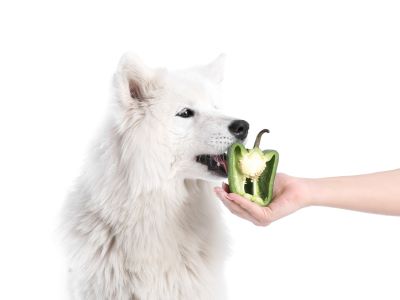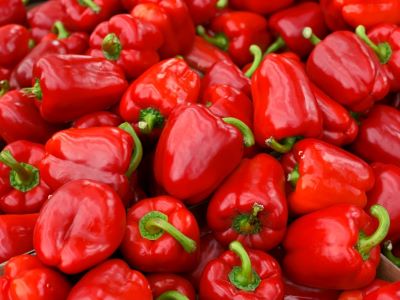If you love munching on bell peppers, you might wonder if you can share them with your furry friend. However, not all human foods are suitable for dogs to consume. Bell peppers are a food that many dog owners may be unsure about. They are a sweet, juicy, and crisp snack food that is also a healthy ingredient and provides a vibrant flash of natural colour but, Can Dogs Eat Bell Pepper?
In this article, we will answer the question Can dogs eat bell pepper? by discussing the benefits and drawbacks of feeding bell peppers to your dog. Continue reading to find out!

Can Dogs Eat Bell Pepper?
Yes, dogs can eat bell peppers and it is absolutely safe for them to consume. If eaten in moderation and in moderate quantity it serves a lot of health benefits to the dog. Bell peppers are rich in vitamins and serve great nutritional benefits to the dog.
Apart from this bell peppers are rich in antioxidants which protect their body from allergies. It also helps them to reduce inflammation and strengthen their immune system.
Bell peppers come in various forms and all of them might not be good for them. You should avoid giving your dog hot peppers, jalapenos and chilli peppers[1] as it can easily irritate their skin. Do not add any seasoning to the bell pepper made to feed the dog.
While introducing the bell pepper to your dog start by feeding a small amount of it. Monitor your dog upon feeding the bell pepper and if it does not suit your dog or causes an allergic reaction then avoid feeding it to them.
Can Dogs Eat Green Pepper?

Green peppers are a type of bell pepper that is harvested before it fully matures. They are a rich source of vitamins and minerals such as vitamin C, vitamin K, vitamin A, and potassium. They are also low in calories, making them a great addition to a healthy diet for humans[2].
So, can dogs eat green pepper? The answer is yes, dogs can eat green peppers. Green peppers are not toxic to dogs and can be a healthy addition to their diet. In fact, many commercial dog foods include bell peppers as an ingredient due to their nutritional benefits. However, it is important to note that dogs have different nutritional needs than humans, so green peppers should only be given to dogs in moderation.
Can Dogs Eat Red Peppers?

Yes, dogs can consume Red peppers in moderation, to give a quick response. For people, red peppers are a wholesome and nutritious diet, and they can also be good for dogs. They are a fantastic source of potassium, vitamin C, and other vitamins and minerals. These nutrients can strengthen a dog’s immune system and keep them healthy; they are necessary for a dog’s overall health and well-being.
According to the American Kennel Club, red bell peppers are the best to feed your dog, as a typical red pepper has the highest amounts of antioxidants and vitamins.
Can Dogs Eat Yellow Pepper?

Can dogs eat yellow pepper? The answer is yes, dogs can eat yellow peppers, and they can be a healthy addition to your dog’s diet. In fact, yellow pepper is also a great source of vitamins and minerals that can help support your dog’s overall health.
Yellow peppers are packed with vitamin C, which can help boost your dog’s immune system and protect against illnesses. They are also a good source of vitamin A, which is important for maintaining healthy eyes and skin. Additionally, yellow peppers contain fibre, which can aid in digestion and keep your dog feeling full.
Benefits of Feeding Bell Pepper to Your Dog
Feeding bell pepper to your furry friend can have various benefits. Here are some of the key benefits of feeding bell pepper to your dog:
Rich in Nutrients:
Bell peppers are a great source of vitamins and minerals, including vitamin C, vitamin A, and potassium. These nutrients are essential for a dog’s overall health and can help to support their immune system, promote healthy skin and coat, and keep their bones and teeth strong.
High in Fiber:
Bell peppers are also high in fibre, which can help to keep your dog’s digestive system healthy and regular. Fibre helps to promote healthy bowel movements and can prevent constipation and other digestive issues in dogs.
Low in Calories and Fats:
Bell peppers are low in calories and fat, making them a great choice for dogs that need to lose weight or maintain a healthy weight. Feeding your dog bell peppers as a healthy snack or treat can help to keep them feeling full and satisfied without adding unnecessary calories or fat to their diet.
Antioxidant Properties:
Bell peppers are rich in antioxidants, which can help to protect your dog’s cells from damage caused by free radicals. This can help to reduce the risk of certain types of cancer and other health problems in dogs.
Bell peppers provide nutrients like vitamin C and fiber, similar to how bananas are a good source of potassium for dogs. But are bananas good for dogs in general?
Drawbacks of Feeding Bell Pepper to Your Dog
While bell peppers can be a healthy addition to your dog’s diet, there are a few drawbacks to keep in mind:
Allergic Reactions:
Like any new food, bell peppers can trigger allergic reactions in some dogs. Symptoms of a food allergy can include itching, skin rashes, hives, vomiting, diarrhoea, and difficulty breathing. If your dog shows any of these symptoms after eating bell peppers, it’s important to discontinue the food and consult with your veterinarian.
Digestive Issues:
While bell peppers are a good source of fibre, too much fibre can also cause digestive issues in dogs. Feeding your dog too many bell peppers can lead to diarrhoea, constipation, and other digestive problems.
Even though bell pepper can provide multiple benefits, it’s best to serve it in moderation and monitor your dog’s reaction after consuming it.
Even though bell pepper can provide multiple benefits, it’s best to serve it in moderation and monitor your dog’s reaction after consuming it, just like you would with kale. But can dogs eat kale safely?
How to Serve Bell Pepper to Your Dog?

Here are some guidelines to safely feed bell pepper to your dog:
Carefully Remove Stems and Seeds:
Before feeding bell pepper to your dog, make sure to remove the seeds and stem. These parts of the pepper can be difficult for your dog to digest and can pose a choking hazard.
Cut into Smaller Pieces:
Cut the bell pepper into small, bite-sized pieces that are easy for your dog to chew and swallow. This will also help to reduce the risk of choking.
Cooked or Raw:
Bell peppers can be served to your dog either raw or cooked. If you choose to cook the bell pepper, avoid using any spices or seasonings that may be harmful to your dog
Consider Mixing with Other Foods:
To make the bell pepper more appealing to your dog, you may want to mix it with other foods they enjoy. For example, you could mix bell pepper with some cooked chicken or rice.
You can serve raw or cooked bell pepper to your dog. If cooking it, avoid using any seasonings that may be harmful. The same goes for other foods you may cook for your dog, like beetroot. But is beetroot safe for dogs to eat?
FAQs
How Many Bell Peppers Should Your Dog Eat?
If you have a large dog, up to half a bell pepper a day can be beneficial. For smaller dogs, you should serve only 1-3 slices a day.
Does the Color of the Bell Pepper Matter?
If you wish to give your dog the healthiest option, you should feed it red. Red bell peppers are 11 times higher in the antioxidant “beta-carotene” than green bell peppers and contain higher levels of potassium, folate, and lutein.
Can dogs eat chilli?
You should never feed your dog chilli or any other kind of hot pepper, such as jalapeños, cayenne, or piri piri peppers. Although they are not toxic, these kinds of pepper are all very irritating for your dog if they eat any. Dogs not only find capsaicin highly irritating, but it causes gastrointestinal upset too.
Can dogs eat pepper raw?
Yes, dogs can eat raw bell peppers, as long as they have had their stems and seeds removed to prevent choking or dental damage.
Can dogs eat bell peppers cooked?
Yes, it is very safe to serve bell peppers cooked, however, do not add any kinds of oil or seasoning to them.
Conclusion
So, can dogs eat bell peppers? Yes, dogs can eat bell peppers in moderation as part of a healthy and balanced diet. However, it’s important to introduce them slowly and in small amounts and to prepare them in a way that is safe and healthy for your dog. As with any new food, it’s always a good idea to consult with your veterinarian before feeding bell peppers to your dog to ensure that it’s safe for them.
References:
- Spicy is Tasty to Tree Shrews. (n.d.).
- Son, K. (2022, November 23). What Human Food Can Dogs Eat? A Complete Guide. Veterinarians.org.



